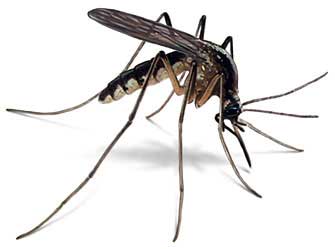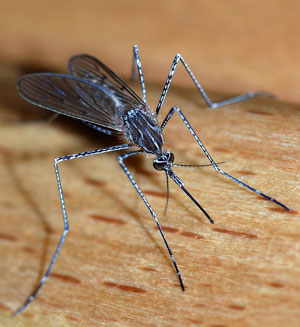Mosquitoes are small flying insects similar to flies and make up the family Culicidae.
There are thousands of mosquito species worldwide. In the Danish fauna, we know of over 1600 species and about 30-35 of these species sting.
This is mainly about the prickly species because they are generally the most interesting.
This theme consists of the following articles:
Mosquito repellents

Mosquito control
Mosquito bites
Mosquito species
You can also read about the prevalence of mosquitoes in Denmark here and mosquitoes in Sweden here.
In the rest of this article you can read more about mosquitoes in general:

What attracts mosquitoes?
It is estimated that around 20% of people are generally stung more than others. This is not thought to be due to one specific cause, but rather a number of factors that increase the risk of being stung:
- Blood typePeople with blood type O attract more mosquitoes than people with blood type A or B (A has the second highest risk and B has the lowest). Around 15% of all people are also less at risk than everyone else because mosquitoes can't sense their blood type (they normally do this via a chemical substance secreted by the body).
- CO2: The carbon dioxide in the air we breathe attracts mosquitoes - and the bigger you are, the more mosquitoes you generally attract. Therefore, adults often get more mosquito bites than children. This also exposes large or overweight people and pregnant women.
- Body odor: Our individual body odor composition has a big impact on how many mosquitoes we attract.
- HeatingThe amount of heat released from the body - also in the form of sweat - has an attractive effect on mosquitoes. If you have been running or exercising, for example, this significantly increases the risk of mosquito bites.
- LysLight attracts mosquitoes, which is why you can use electric light traps for mosquito control, for example.
In addition, there are a number of other factors that are also thought to influence the risk of mosquito bites:
- Metabolism
- Genetics
- Consumption of beer
- Clothing color
- Bacteria on the skin
- Lactic acid
Experts aren't sure how much influence the four factors above have on mosquitoes' tendency to bite us.
5 myths about mosquitoes
1. You have to let the mosquitoes finish sucking
It's a myth that you should let the mosquito finish sucking when it bites.
To dispel this myth, you need to understand the mechanism behind a mosquito bite; the bite injects a protein substance into our blood that prevents the blood from clotting (clotting), making it easier for the mosquito to suck blood. When the protein substance is left in the body, it acts as an itch-inducing allergen because the immune system produces histamines.
The theory behind the myth is that the mosquito is supposed to suck some of the protein back out if you let it finish sucking. However, this is not the case in reality and makes no biological sense.
2. Gin and tonic keeps the mosquitoes away
This myth originates from the British colonists in India who drank tonic water to protect themselves from malaria. At the time, tonic water contained the substance quinine, which does indeed protect against the malaria parasite.
Today, however, tonics do not contain true quinine and therefore have no effect against the malaria parasite. Quinine and tonic have no effect against malaria mosquito or other mosquito species. Quinine is still used in malaria medication.
3. Garlic repels mosquitoes
It's a fact that garlic and other strong odors have a mild deterrent effect on many insects. The theory behind this myth is that a sufficiently high intake of garlic should also deter mosquitoes.
Experts don't completely dismiss the possibility that garlic may have a slight deterrent effect on mosquitoes, but it has never been proven that garlic can help us avoid mosquito bites.
4. B vitamins help against mosquitoes
It has not yet been scientifically proven that B vitamins can help us avoid mosquito bites. The idea behind this theory is that B vitamins change our body odor because we either become less attractive to mosquitoes or can camouflage our body odor to them.
Although this myth has not been proven by science, many people have had good results using B vitamins against mosquitoes.
Read more about B vitamins against mosquitoes here.
5. Certain sounds scare mosquitoes
It has been proven in several scientific studies that sounds and sound frequencies have no effect on mosquitoes. There are several mosquito repellents on the market, but unfortunately they are all ineffective. This applies not only to mosquitoes, but also to all other pests.
Read more about mosquito repellents here.
Don't fear mosquito swarms
It's worth noting that the swarms of mosquitoes commonly seen in summer and fall - typically over shrubbery or trees - are not usually biting midges. In cases where biting midges are present, it's always the males, which don't bite humans or animals anyway.
The males of some species form swarms much more often than others. This is the case for example:
- Glass mosquitoes that form small swarms
- Dancing mosquitoes that form large swarms at dusk
- Winter mosquitoes that form swarms around compost piles and the like.
Mosquitoes and humans
Mosquitoes have been here on Earth for much longer than humans; the oldest records of mosquitoes (anatomically similar to modern ones) are around 79 million years old. In comparison, the human species (Homo) is only around 2.8 million years old.
In a South African cave system, archaeologists have found remnants of 77,000-year-old sleeping mats made from specific plant materials that mosquitoes avoid. This indicates that humans have always been plagued by mosquitoes and have actively tried to avoid them.
Today, billions of dollars are spent every year on mosquito repellents worldwide, and authorities in many countries devote a lot of resources to mosquito control. Even in our neighboring country Sweden, there are public and private campaigns for mosquito control.
Relevant links
Here are links to articles about mosquitoes on a number of foreign sites:
